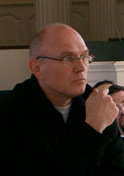Miroslav Volf Quote
Slowly and imperceptibly, the one true God begins acquiring the features of the gods of this world. For instance, our God simply gratifies our desires rather than reshaping them in accordance with the beauty of God’s own character. Our God then kills enemies rather than dying on their behalf as God did in Jesus Christ.
Miroslav Volf
Slowly and imperceptibly, the one true God begins acquiring the features of the gods of this world. For instance, our God simply gratifies our desires rather than reshaping them in accordance with the beauty of God’s own character. Our God then kills enemies rather than dying on their behalf as God did in Jesus Christ.
Related Quotes
About Miroslav Volf
Miroslav Volf (born September 25, 1956) is a Croatian Protestant theologian and public intellectual and Henry B. Wright Professor of Theology and director of the Yale Center for Faith and Culture at Yale University. He previously taught at the Evangelical Theological Seminary in his native Osijek, Croatia (1979–80, 1983–90) and Fuller Theological Seminary in Pasadena, California (1990–1998).
Having received two advanced degrees under the German theologian Jürgen Moltmann, Volf has been described as a "theological bridge builder. The main thrust of his theology is to bring Christian theology to bear on various realms of public life, such as culture, politics, and economics. He often explores dialogues between different groups in the world—such as between denominations, faiths, and ethnic groups.
Volf has served as an advisor for the White House Office of Faith-Based and Neighborhood Partnerships and for several years co-taught a course at Yale with former British prime minister Tony Blair on globalization. He is a frequent commentator on religious and cultural issues in popular media outlets such as CNN, NPR, and Al Jazeera. Volf won the 2002 University of Louisville and the Louisville Presbyterian Theological Seminary Grawemeyer Award in Religion and his 1996 book Exclusion and Embrace was named by Christianity Today as one of the 100 Most Influential Books of the Twentieth Century.
Having received two advanced degrees under the German theologian Jürgen Moltmann, Volf has been described as a "theological bridge builder. The main thrust of his theology is to bring Christian theology to bear on various realms of public life, such as culture, politics, and economics. He often explores dialogues between different groups in the world—such as between denominations, faiths, and ethnic groups.
Volf has served as an advisor for the White House Office of Faith-Based and Neighborhood Partnerships and for several years co-taught a course at Yale with former British prime minister Tony Blair on globalization. He is a frequent commentator on religious and cultural issues in popular media outlets such as CNN, NPR, and Al Jazeera. Volf won the 2002 University of Louisville and the Louisville Presbyterian Theological Seminary Grawemeyer Award in Religion and his 1996 book Exclusion and Embrace was named by Christianity Today as one of the 100 Most Influential Books of the Twentieth Century.
